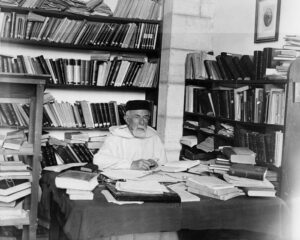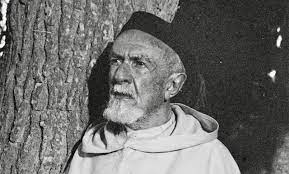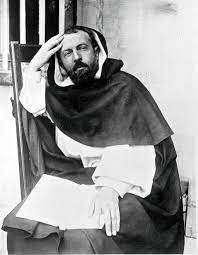On the occasion of the study day on Father Marie Joseph Lagrange, organised on 9 March 2024 at the Dominican convent in Nice, we would like to remind you of the life and work of the founder of the École biblique et archéologique française de Jérusalem.
Born in Bourg en Bresse in 1855, Marie Joseph Lagrange was completing his doctorate in law when he felt called to the priesthood and entered the seminary of Saint-Sulpice in Issy les Moulineaux. There he discovered the Dominican ideal and received the habit in 1879 for the province of Toulouse.
Expelled from France by the decrees of 1880, the brothers took refuge in Spain. Six years later, Fr Lagrange returned to Toulouse where he taught and preached the Gospel. He was then sent to the University of Vienna to study Oriental languages before going to Jerusalem to found a school of Sacred Scripture: the École Biblique de Jérusalem was born. Father Lagrange spent 45 years there and was never idle: he founded the École Biblique in 1890, the Revue Biblique in 1892, the Études Bibliques collection in 1898, and developed archaeological research. All these “creations” became references that brought the school into contact with scientists from all over the world. Called back to God on 10 March 1938 while visiting France, his remains were returned to Jerusalem in 1967 and now lie in the choir of Saint Stephen’s Basilica.
Born on the feast day of Saint Thomas Aquinas, who already in the 13th century professed that the Christian faith is neither incompatible nor contradictory with the exercise of reason, Lagrange became his disciple. By founding the École Biblique et Archéologique Française de Jérusalem, he took on a major challenge: the use of reason for scientific criticism of the Bible. He was not afraid of scientific discoveries, knowing that “the truth makes you free”. (John 8, 32). In addition, he advocated a method that confronted the interpretation of the Bible with the terrain in which it was born and from which it was nourished. This is still the focus of the School’s research today.
Lagrange advocated an in-depth analysis of the texts in the light of their historical and cultural context. This method, subversive at the time, made it possible to dissect the Scriptures by giving new access to a whole field of possibilities. Exegetes began to try to distinguish the historical layers, literary genres and editorial influences that had shaped the texts. Lagrange set about the painstaking task of reconstructing the biblical texts in their most authentic form. His mastery of the ancient biblical languages, combined with a scrupulous analysis of the available manuscripts, enabled him to produce critical editions of several books of the Old and New Testaments.
These editions, characterised by their philological precision and their fidelity to the original sources, remain benchmarks for today’s biblical exegetes and make the École a key centre for biblical studies.
 As a theologian, Father Lagrange strove to harmonise the discoveries of biblical criticism with the Christian faith. Although a fervent advocate of critical scholarship, he never lost sight of the importance of faith in his quest for truth. For him, biblical criticism was a means of better understanding the Scriptures and deepening Christian spirituality, rather than an exercise in devaluing them. His research blossomed into a savoury, personal, life-giving knowledge of God.
As a theologian, Father Lagrange strove to harmonise the discoveries of biblical criticism with the Christian faith. Although a fervent advocate of critical scholarship, he never lost sight of the importance of faith in his quest for truth. For him, biblical criticism was a means of better understanding the Scriptures and deepening Christian spirituality, rather than an exercise in devaluing them. His research blossomed into a savoury, personal, life-giving knowledge of God.
The cause for the beatification of Father Marie-Joseph Lagrange, o.p., was opened in 1986. He is now a “Servant of God”, the first step towards beatification.
Emeline d’Hautefeuille

